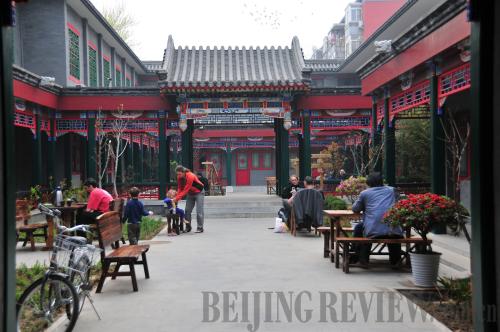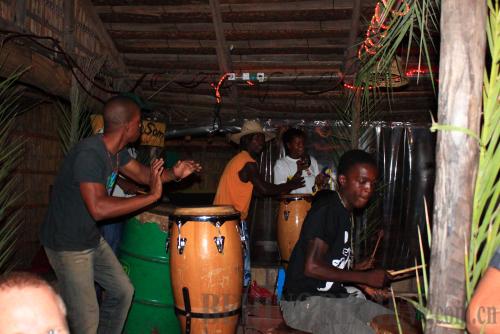|
 |
|
TALKING POINT: Travelers exchange information at the bar of Beijing Heyuan International Youth Hostel (LU HUI) |
 |
|
Beijing Heyuan International Youth Hostel features traditional Chinese architectural style (LU HUI) |
 |
|
Many national flags hang from the ceiling of the bar at Malthohe Hostel in Namibia (YANG LI ) |
 |
|
African performances are put on in the evening at Fatima's Nest Youth Hostel in Tofo, a small town in Mozambique (YANG LI) |
A decade in, China's youth hostel industry is still in its own youth. Like China's new generation, it's full of potential. And hostels are growing in popularity with young people who are fans of the outdoors and traveling.
Yang Li counts herself as one such fan. In late April, she found herself at Beijing's Heyuan International Youth Hostel mid-journey. The main draw of the place for Yang was its courtyard; she wanted to set up a tent there to sleep in. While this may sound like a bizarre request, Lu Hui, the hostel owner, agreed to the idea. He said he understood how enthusiastic Yang was toward camping – she had just come back from Africa after all.
Nowadays in China there are many international youth hostels just like Lu's. IYH (International Youth Hostel) has been a global brand for a century, and arrived to the Chinese mainland last decade. It was in the summer of 1998 when the Guangdong Tourism Administration introduced the concept of "international youth hostel," establishing hostels in cities like Guangzhou and Zhuhai. In 1999 and 2000, respectively, youth hostel associations were founded in Guangdong and Beijing. Since then, their popularity in China has soared.
More than just traveling
"I love animals. Though I majored in marketing, my dream has always been to visit all the wildlife reserves in Africa and film them for documentaries," said Yang Li, a senior at the Taiyuan University of Technology. From January to April, Yang traveled across South Africa, Mozambique and Namibia pursuing her dream. "Youth hostels offered me the best opportunity to experience local culture at the lowest price," Yang told ChinAfrica.
Yang found suitable youth hostels in Coast to Coast, a popular South African travel guide. They left a lasting impact: At the Jungle Monkey Hostel in South Africa, she saw a naughty monkey getting food from travelers; at Fatima's Nest youth hostel in Tofo, a small town in Mozambique, she walked barefoot on a trail.
"Besides photographing, the most important thing I gained from the trip is an increased trust of other people," she said.
After staying at the Malthohe Hostel in Namibia for three days, Yang decided to head to another locale. She left her computer and camera at the hostel for safekeeping. "I didn't ask for a receipt. I simply trusted them because they are honest. Nothing was missing when I came back."
Yang, though, misses her tent days. There are two types of accommodation when it comes to youth hostels on African wildlife reserves: country inns and camp sites. For 10 yuan ($1.46) a day, camping is attractive cost-wise. "Also, I just put my valuables in the tent. It was so strange that without any anti-burglary measures, I still felt very secure," she said.
Distinct features
A travel junkie, Yang is keyed into hostel culture. "Hostels in China are different from those in Africa. They provide customers with specific services. In Africa, both hostel staff and customers are relaxed," she said. As far as cost was concerned, "in Africa, they charge 60 yuan ($8.8) per person. In China, the cost ranges from 15 to 80 yuan ($2.2-$11.7)."
Youth hostels are new to China and though they are becoming a popular choice for many people, most don't completely understand the principle behind them. Hostels advocate autonomy. Travelers need to rent their own bed sheets and dishes, shop at nearby supermarkets and cook for themselves. "Although some of these concepts are good, it's taking time for Chinese people to accept them. As we are running a business, we have to address this," said Lu Hui of Heyuan International Youth Hostel.
To keep his guests comfortable, Lu offers clean and tidy rooms, and travelers don't have to make their beds themselves. Large bottles of shampoo are available in the bathrooms instead of disposable small packets. Standard rooms come with TVs and toiletries, and in Lu's Shandong hostel branch there's a fully equipped kitchen for guests.
Introducing Chinese culture is a major feature of youth hostels in China. Song Benhua, a manager of Beijing's Lama Temple Youth Hostel, explained to ChinAfrica that along with booking tickets for Peking opera, acrobatics and martial arts performances, the city's hostels also often offer tours of neighborhoods and hutongs. In addition, free activities such as dumpling making are also very popular. "We want to attract [visitors] with the uniqueness of Chinese culture," said Song.
Bumpy road ahead
Ever since China's first youth hostel was established in Zhaoqing, Guangdong Province in 1998, their presence has increased rapidly. Currently, there are 146 hostels affiliated with IYH. More than 90 percent of Chinese youth hostels are privately run.
"Frankly speaking, for the youth hostels in China, the best [period] hasn't come yet," Lu said. Apart from big cities like Beijing and Shanghai, annual occupancy rates for hostels elsewhere aren't very high. The ratio of foreign to Chinese guests is seven to three, and most of the Chinese are young backpackers and students on short-term studies. "This is because on one hand, youth hostels have a short history in China and many people don't know [about them]. On the other, it lacks government support," Lu explained.
In other countries, government subsidies are an important financial source for youth hostels. There are also preferential tax policies and other forms of support. In Poland, for example, primary and secondary students are required to stay in hostels for a week as a kind of supplement to classroom education. China doesn't have this kind of policy.
Lu, while realistic about the challenges facing hostels, is an optimist. "We do have difficulties now, but I'm sure we're headed for a better future. More and more people are learning about youth hostels and choosing them. This will become the trend." |